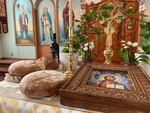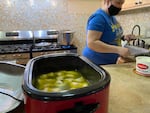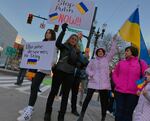A handful of people stood among the wooden pews, heads bowed in prayer, Saturday at the Saint John the Baptist Ukrainian Orthodox Church in Portland. The divine liturgy is always a quiet worship service, but this weekend’s felt especially powerful and intimate, as congregation members prayed for people killed during Russia’s ongoing invasion of Ukraine.
“For our home in Ukraine, and for all her people, let us pray to the Lord,” Father Volodymyr Yavorskyi sang in a low, rhythmic monotone from the church’s sanctuary, shifting back and forth between English and Ukrainian. He swung a gold censer that released incense smoke as a small choir sang hymns nearby.

Father Volodymyr Yavorskyi, right, prays during divine liturgy at the Saint John the Baptist Ukrainian Orthodox Church in Portland in late February, just a couple of days after learning about the Russian invasion of Ukraine.
April Ehrlich / OPB
Yavorskyi moved to the United States from Western Ukraine eight years ago as part of a program that trains Orthodox priests. He left his family behind.
“Everyone: Brother, two sister, cousin, parents, friends,” he said. “Everyone.”
He said most of the church’s 160 members have someone in Ukraine, and they’re distraught over being so far from their relatives who are in danger.
“It’s really bothering me; really bothering me that I am here and not in Ukraine helping people,” he said.
Yavorskyi spoke quickly as he ran through his thoughts on the Russian invasion and what more could be done to stop it. He said he wants the U.S. and European countries to be more aggressive, for example by providing more weapons to the Ukrainian government. In his eyes, it’s not just Ukraine that’s in danger.
“Ukrainian soldiers, they don’t fight just for Ukraine: They fight for the whole world,” he said. “They fight for the whole civilized world. The world that wants to live in freedom, not in a dictatorship.”

At the St. John the Baptist Ukrainian Orthodox Church in Portland, a table in front of the church's sanctuary holds bread, wine and flowers.
April Ehrlich / OPB
Downstairs in the church’s basement, volunteers boiled pierogies in crock pots to sell to visitors. They do this every weekend, but Saturday was busier than usual. They sold out of cabbage rolls within the first hour. Many customers were new and heard about the sale through word-of-mouth.
“It’s just the right thing to do,” said Kyla Yonetani, who bought a tray of pierogies.
Although Yonetani and her husband aren’t Ukrainian, they have friends and family who have visited the country frequently and they feel a strong connection to it. They showed up dressed in the blue and gold, the colors of the Ukrainian flag.
“It’s just to support them and be part of the community and show the community that we genuinely do care,” Yonetani said.
A few regulars also stopped by, including Bogdan Liski. His Ukrainian mother and grandmother used to make pierogies back home in Bosnia.
“We had war in 1991 to ‘95, and I escaped from Bosnia,” Liski said. “I know what is war, how it is. I think this, what Russia is doing, it’s no good.”

Natalia Nahurska prepares a crock pot of pierogies — a dumpling filled with meat or vegetables — for customers at the St. John the Baptist Ukrainian Orthodox Church in Portland.
April Ehrlich / OPB
There isn’t much data showing how many people immigrated to Oregon from Eastern European countries. Portland State University researchers in 2014 estimated that about 22,000 people from Slavic countries lived in Multnomah County in 2011.
Tatiana Terdal, an organizer and board member with the Ukrainian American Cultural Association of Oregon and Southwest Washington, discourages lumping people from so many different countries under one generic label.
“We’re trying to tell the county: No, we’re Ukranians,” Terdal said. “We have our own culture and our own language. And we have a big Ukrainian community here.”
Terdal says many of the region’s Ukrainian immigrants are religious refugees who moved here shortly after the fall of the Soviet Union. During its existence, the Soviet Union had an unofficial policy of state atheism and leaders tried to eliminate religion within its borders. After the Soviet Union dissolved, the United States eased immigration laws to allow immigrants from countries that were formerly part of the USSR. Thousands of religious refugees fled to cities like Portland.
Today, the Portland area has three Ukrainian churches for three denominations: Bible, Baptist, and Orthodox churches.

The morning after hearing about the Russian invasion of Ukraine, people rally in support of Ukrainians near the waterfront in downtown Portland.
April Ehrlich / OPB
Days after hearing about Russian’s invasion of Ukraine, hundreds of Ukranians and supporters protested against war in downtown Portland.
Yuri Boyechko was among them. He moved to the United States from Ukraine as a religious refugee in the late 1990s.
“I couldn’t believe it,” he said of the moment he heard about the invasion. “We knew something was going to happen. All our history, we are persecuted by Russia. But we couldn’t imagine it was going to be this way.”
Also among the crowd was a couple who moved to Portland from Ukraine’s capital, Kyiv, a month ago. Andrii Kepko and his wife, Yana Nimanchuk, came to Oregon for his job as a software engineer.
“We’re trying to settle down here, trying to live a normal life, then we get the news that war broke out,” Kepko said.
The invasion happened in the middle of the night. Kepko said he and Nimanchuk tried desperately to warn their relatives.
“We immediately tried to call and wake everyone up, because some of our friends and family woke up from the explosions,” he said. “Because there were missiles falling on Kyiv.”
Kepko and Nimanchuk don’t feel lucky that they were able to leave Ukraine before war broke out.
“No,” Nimanchuk said. “I want to be with my family.”
